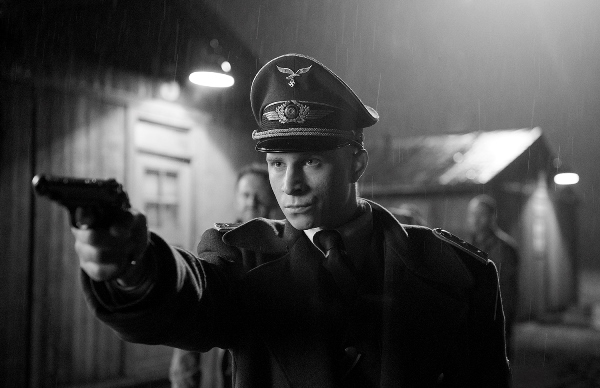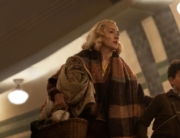![]() The Captain opens in wintry black-and-white April 1945, two weeks before the end of the war. Arrogant officer Junker (Alexander Fehling) is aiming his rifle at a fleeing figure and taunting “Come back, Little Piggy!” He looks like SS-Sturmführer Amon Goeth picking off Jews in Schindler’s List, but this captain’s target is a German soldier. Dodging his bullets, 19-year-old Willi Herold (Max Hubacher) flees through fields and woods, past warning signs against looting and the hanging bodies of soldiers marked as deserters.
The Captain opens in wintry black-and-white April 1945, two weeks before the end of the war. Arrogant officer Junker (Alexander Fehling) is aiming his rifle at a fleeing figure and taunting “Come back, Little Piggy!” He looks like SS-Sturmführer Amon Goeth picking off Jews in Schindler’s List, but this captain’s target is a German soldier. Dodging his bullets, 19-year-old Willi Herold (Max Hubacher) flees through fields and woods, past warning signs against looting and the hanging bodies of soldiers marked as deserters.
Writer/director Robert Schwentke returned to Germany from making Hollywood flicks (Flight Plan, RED, the “Divergent” series) to cinematically challenge the myth of the “purity of arms” of the Wehrmacht, the regular army, during World War II. In contrast, the killings by the Einsatzgruppen, the death squads in Eastern Europe, and the SS in concentration camps have been acknowledged. Born more than 20 years after the war, Schwentke studied film in the United States, and he was struck on how Germany had still not produced a feature film on the culpability of regular soldiers in the war.
While two German films have looked at the villains, they were at the senior level: Theodor Kotulla’s Death Is My Trade (1977), the fictionalized biography of Rudolf Hess, and Heinz Schirk’s The Final Solution: The Wannsee Conference (1984). The more insidious reality was denied until the Hamburg Institute for Social Research toured the exhibition War of Extermination: Crimes of the Wehrmacht 1941–1944, beginning in 1995. The newly available archival evidence proved the Wehrmacht was directly involved, on a daily basis, in genocide and the mass killings of civilians, POWs, and partisans—Michael Verhoeven’s The Unknown Soldier (2006) documented the resulting uproar. Schwentke wanted to provoke discussion about these perpetrators through the true story of the real-life Willi Herold and his unit.
Avoiding execution, Corporal Herold comes out of hiding to scrounge for food and shelter. In a crashed army car, he finds much needed boots and a warm coat and then realizes they were a captain’s, complete with medals. Strutting around like Charlie Chaplin’s Great Dictator, he imitates in his new clothes the top brass he’s fought under for two years. He is interrupted by Private Freytag (Milan Peschel), who presumes the younger man is an officer he can report to after becoming separated from his squad. Freytag helpfully maneuvers the car out of the ditch and starts serving as the driver. As they encounter more stragglers, Herold pulls up his too long pants and convincingly concocts a mission: he’s under direct orders from the führer to survey conditions in Germany behind the front.
The duo seem headed into comically satirical territory, enjoying provisions commandeered by Herold’s presumed position. Herold even gets a ragtag group of tough soldiers to pull his car when it runs out of gas and machine gunners to tow his car. Until, goaded by the sadistic bully Kapinski (Frederick Lau), he has to prove himself by pronouncing sentence and personally carrying out an execution on (another) deserter—definitely not amusing, to him or to Freytag, who suspects that Herold’s an imposter. But flattered by everyone’s obedience, the erstwhile captain seems transformed by the uniform. “Task Force Herold” now can’t avoid another assignment: to inspect a prison camp for deserters.
The detention facility, Camp II, looks exactly like many well-known German concentration camps, with blocks of barracks and the looming guard tower that dominates the scenes. While the guards have been enjoying meat and schnapps, the haggard prisoners—all German soldiers—are barely subsisting on boiled potatoes. An officious military bureaucrat insists that Herold can solve the problem of the lack of instruction from the judicial branch. The resulting debate about courts-martial for prisoners would be funny if it weren’t so deadly serious about the fate of the deserters.
Herold now plays his role with gusto, and his orders are accepted enthusiastically, even when the camera reveals in a wider shot just what an absurd figure he is. He first permits, then coolly insists on encouraging, each soldier to personally participate in an orgy of violence that is deemed justice. The victims are more heard than seen—the sound design, set off by Martin Todsharow’s tense, dissonant electronic score, won Best Sound at the German Film Awards. The only objecting officer just complains about the procedures. Clearly, Schwentke intends for these men’s actions to parallel exactly what the Wehrmacht had participated in against Jews and Roma throughout Europe.
You can see this astute film as an excoriating portrait of Nazism specifically or fascism in general. But stay through the closing credits for the eerie improvised scene, in color, where past easily meets present.







Leave A Comment